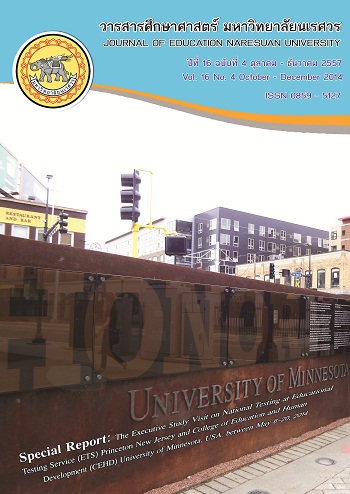การพัฒนากลยุทธ์การบริหารแบบมีส่วนร่วมในสถานศึกษาขั้นพื้นฐาน สังกัดสำนักงานเขตพื้นที่การศึกษาประถมศึกษากำแพงเพชร
Main Article Content
Abstract
บทคัดย่อ
การวิจัยนี้มีวัตถุประสงค์เพื่อ1)ศึกษาสภาพปัญหาและปัจจัยที่เกี่ยวข้องกับการบริหารแบบมีส่วนร่วม 2)พัฒนากลยุทธ์การบริหารแบบมีส่วนร่วม 3)ประเมินกลยุทธ์การบริหารแบบมีส่วนร่วมในสถานศึกษาขั้นพื้นฐาน สังกัดสำนักงานเขตพื้นที่การศึกษาประถมศึกษากำแพงเพชร ดำเนินการวิจัย 3 ขั้นตอน คือ 1) ศึกษาสภาพ ปัญหา และปัจจัยที่เกี่ยวข้องกับการบริหารแบบมีส่วนร่วม โดยใช้แบบสอบถามบุคลากรที่เกี่ยวข้องกับการบริหารแบบมีส่วนร่วม 3 กลุ่ม ได้แก่ ผู้บริหาร ครูผู้สอน และคณะกรรมการสถานศึกษา และโดยการสนทนากลุ่ม จำนวน 2 ครั้ง จากผู้เกี่ยวข้องจำนวน 12 คน และ 11 คน 2) พัฒนากลยุทธ์การบริหารแบบมีส่วนร่วมในสถานศึกษาขั้นพื้นฐานที่ประสบความสำเร็จ โดยสัมภาษณ์ผู้บริหารสถานศึกษา หัวหน้าฝ่ายวิชาการ ครูผู้สอน และคณะกรรมการสถานศึกษา โดยการประชุมเชิงปฏิบัติการเพื่อจัดทำร่างกลยุทธ์ จำนวน 2 ครั้ง และตรวจสอบความถูกต้องของกลยุทธ์โดยการสัมมนาอิงผู้เชี่ยวชาญ 3) ประเมินกลยุทธ์ที่ปรับปรุงแล้ว 4 ด้าน คือ ด้านความสอดคล้อง ด้านความเหมาะสม ด้านความเป็นไปได้ และด้านความเป็นประโยชน์ โดยใช้แบบประเมินกับผู้ทรงคุณวุฒิ จำนวน 20 คน
ผลการวิจัยพบว่า
1. สภาพการบริหารแบบมีส่วนร่วมในสถานศึกษาขั้นพื้นฐานสังกัดสำนักงานเขตพื้นที่การศึกษาประถมศึกษากำแพงเพชร พบว่า ด้านการวางแผน สถานศึกษาเปิดโอกาสให้ครูเข้ามามีส่วนร่วมในการวางแผนปฏิบัติการประจำปี เพื่อพัฒนาด้านวิชาการ ด้านบุคลากร ด้านงบประมาณ และด้านบริหารงานทั่วไป ด้านการปฏิบัติตามแผน สถานศึกษาเปิดโอกาสให้บุคลากรมีส่วนร่วมในการปฏิบัติตามแผนการบริหารงานทั่วไป โดยมีส่วนร่วมในการบำรุง ดูแล อาคารสถานที่ และสภาพแวดล้อมของสถานศึกษาให้อยู่ในสภาพ มั่นคง ปลอดภัย เหมาะสม ด้านการประเมิน สถานศึกษาเปิดโอกาสให้บุคลากรมีส่วนร่วมในการประเมินการบริหารงานทั่วไป โดยมีส่วนร่วมในการประเมินการจัดกิจกรรมต่างๆ ของสถานศึกษา และด้านการปรับปรุง สถานศึกษาเปิดโอกาสให้บุคลากรมีส่วนร่วมในการปรับปรุงจากผลการประเมินการบริหารงานทั่วไป โดยมีส่วนร่วมในการปรับปรุงซ่อมแซมอาคารเรียน อาคารประกอบและสถานที่ให้สามารถใช้งานให้เกิดประโยชน์สูงสุด ส่วนปัญหา ด้านการวางแผน ได้แก่ ข้อมูลที่ใช้ในการวางแผนในการบริหารแบบมีส่วนร่วมมีไม่เพียงพอ ด้านการปฏิบัติตามแผน ขาดการประชุมปรึกษาหารือระหว่างผู้เกี่ยวข้องเพื่อพิจารณานำโครงการทุกประเภทไปปฏิบัติ ด้านการประเมิน กรรมการสถานศึกษาที่เป็นบุคลากรภายนอกไม่มีส่วนร่วมในการติดตาม และประเมินผลงานของสถานศึกษา และด้านการปรับปรุง รูปแบบการมีส่วนร่วมเพื่อนำผลการประเมินด้านต่างๆ ไปใช้ไม่เหมาะสม
2. การพัฒนากลยุทธ์การบริหารแบบมีส่วนร่วมในสถานศึกษาขั้นพื้นฐาน สังกัดสำนักงานเขตพื้นที่การศึกษาประถมศึกษากำแพงเพชร พบว่า กลยุทธ์ที่สร้างขึ้นประกอบด้วย วิสัยทัศน์ 4 พันธกิจ 4 ประเด็นกลยุทธ์ 4 เป้าประสงค์ 9 กลยุทธ์ 26 ตัวชี้วัด และ 29 มาตรการ
3. ผลการประเมินกลยุทธ์การบริหารแบบมีส่วนร่วมในสถานศึกษาขั้นพื้นฐาน สังกัดสำนักงานเขตพื้นที่การศึกษาประถมศึกษากำแพงเพชร ในด้านความสอดคล้องของวิสัยทัศน์ พันธกิจ ประเด็นกลยุทธ์ เป้าประสงค์ กลยุทธ์ ตัวชี้วัด และมาตรการ มีความสอดคล้องกัน ความเหมาะสม ความเป็นไปได้ และความเป็นประโยชน์อยู่ในระดับมาก
คำสำคัญ : การพัฒนากลยุทธ์/ การบริหารแบบมีส่วนร่วม
Abstract
The purposes of this research were 1) to study the states, problems, and factors related to participative management, 2) to develop the strategies for participative management and 3) to evaluate the strategies in participative management of basic education schools under Kamphaeng Phet Primary Education. This research was divided into 3 phases. In the first phase, the research focused on the states, problems, and factors related to participative management. The data were obtained by using a questionnaire as well as enquiring 3 group of personnel consisting of administrators, teachers, and school board and 2 focus group discussions comprising with 12 and 11 personnel. In the next phase, developing the strategies was done by studying the best practices of 6 high-achievement schools in participative management from 24 personnel consisting of 6 administrators, 6 academic teachers, 6 teachers and 6 school board. Using SWOT analysis and making draft strategies were applied by 2 workshops comprising with 15 and 16 personnel. In addition, critics and comments from 9 experts were obtained. Finally, evaluating the readjusted strategies was organized in 4 areas: consistency, propriety, feasibility, and utility by using a questionnaire with 20 experts.
The findings were as follows:
1. The states of participative management of Basic Education School under Kampheang Phet Primary Education Office were mostly released by educational opportunities for teachers to participate in the annual operating plan for the development of academic personnel, budget, and general administration. There were educational opportunities for personnel to participate in the general management plan by participating in school buildings maintenance and environment of the schools in terms of stability, and suitability. For the evaluation, there were educational opportunities for personnel to be involved in the assessment of the general management by participating in evaluation of educational activities. For the school improvement and development, there were educational opportunities for personnel to join the improvement of the evaluation, general administration by participating in the renovation of the school buildings and places for the maximum benefits. As for the problems of planning, lack of the data used in participatory management. As for the implication problem, lack of consultation among the stakeholders to consider the projects and to take action. As the monitoring problems, evaluation of school board to lack of proper consultation on school board was not involved and evaluated. In terms of improvement and development, the models of evaluation were inappropriate.
2. The development of the strategies for participative management of Basic Education School under Kampheang Phet Primary Education consisted of a vision, 4 missions, 4 strategic issues, 4 goals, 9 strategies, 26 indicators, and 29 measures.
3. The assessment of the strategies for the development of participative management of Basic Education School under Kampheang Phet Primary Education in terms of consistency, propriety, feasibility and utility were all rated at the high levels.
Keywords: Strategic Development/ Participative Management
Article Details
The owner of the article does not copy or violate any of its copyright. If any copyright infringement occurs or prosecution, in any case, the Editorial Board is not involved in all the rights to the owner of the article to be performed.


